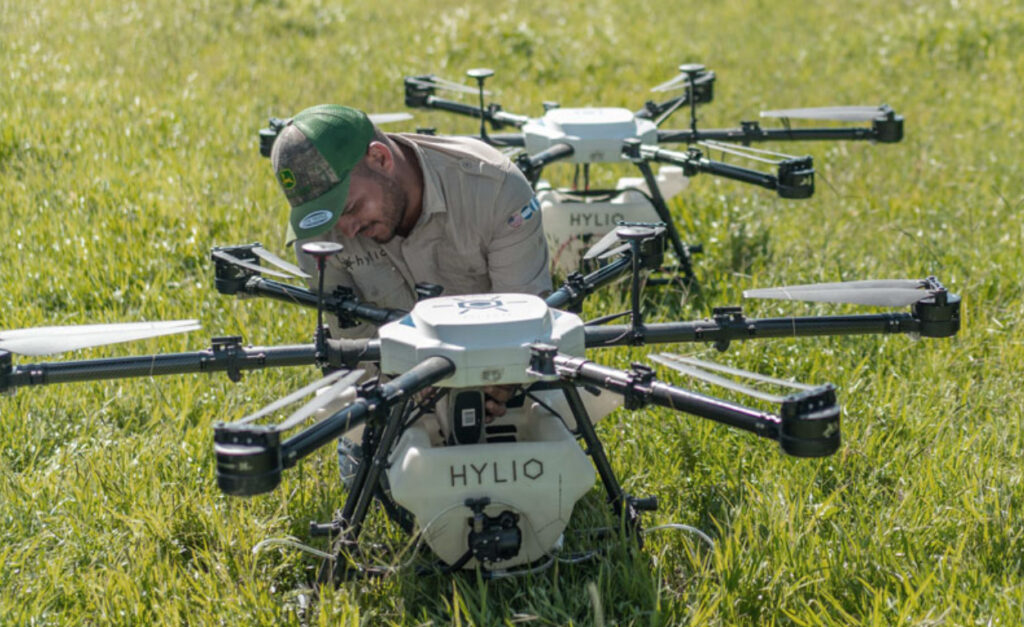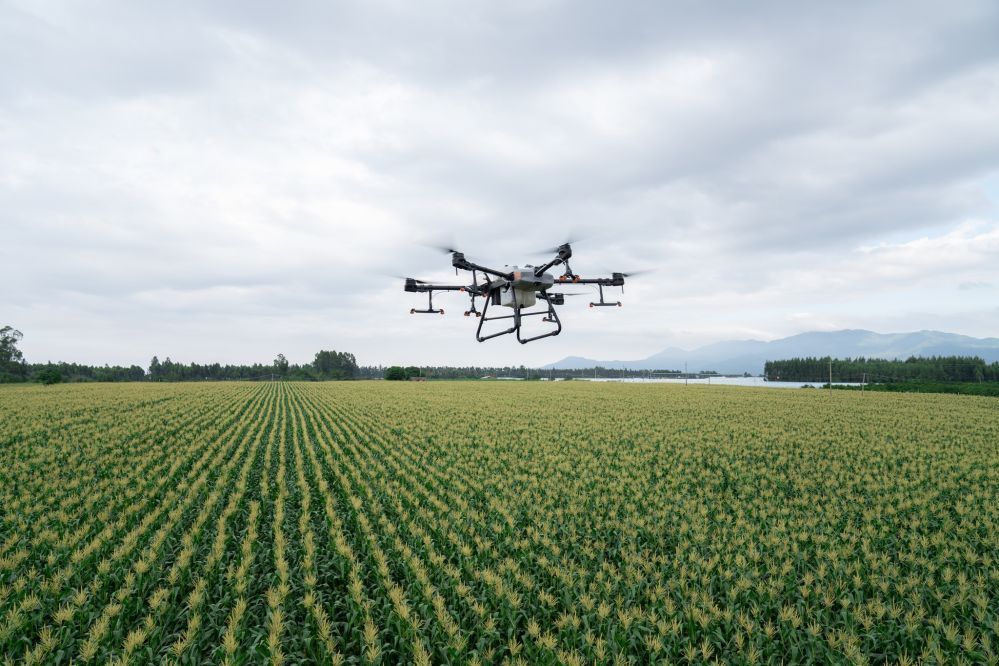Proposed legislation targeting Chinese drone maker DJI Technologies could have a devastating effect on the US agricultural sector, claimed opponents this week as an amendment designed to curb DJI’s activities in the US was tagged onto a defense spending bill moving through Congress.
Introduced to the US House of Representatives in April 2023, the Countering CCP Drones Act (HR 2864) would add equipment and services from DJI—the market leader in ag spraying drones in the US—to something called the ‘covered list.’ This would prevent DJI from getting FCC (Federal Communications Commission) licenses for future drone models, and potentially lead to the revocation of existing FCC authorizations.
While the bill isn’t new, the move to tack it onto the National Defense Authorization Act (NDAA), which passed in the House last week, has sharply focused minds in the ag sector, which is heavily reliant on DJI drones.
Should similar provisions be added to the Senate version of the NDAA, and the NDAA is signed into law, it could come into effect by the end of the year.
And that would spell bad news for US farmers, who have been steadily increasing their use of spray drones in recent years, with 3.7 million acres sprayed by drone in 2023 across 41 states and 50 crops, mostly by Chinese-made drones, Agri Spray Drones CEO Taylor Moreland told AgFunderNews.
“Not allowing people to operate Chinese-made drones in rural communities would be a job killer in rural America.”
-
- The American Drone Security Act, passed in late 2023, prohibits federal agencies from acquiring unmanned aircraft systems (UAS) produced by certain foreign entities including DJI.
- A 2017 Department of Homeland Security intelligence bulletin claimed that “The Chinese government is likely using information acquired from DJI systems as a way to target assets they are planning to purchase. For instance, a large family-owned wine producer in California purchased DJI UAS to survey its vineyards and monitor grape production. Soon afterwards, Chinese companies began purchasing vineyards in the same area.”
Hylio CEO: ‘We’ve been in an agricultural information war with China for years’
Supporters of the bill claim DJI’s drones could send sensitive data to the Chinese government, while US drone maker Guardian Agriculture has described DJI drones as “the ultimate Trojan Horse” with the potential to go rogue mid-flight thanks to over-the-air software updates.
Arthur Erickson, CEO at US drone maker Hylio, told AgFunderNews: “I do believe there are legitimate security concerns although I don’t think an outright ban is necessarily the right strategy. We’ve been in an agricultural information war with China for years and while it doesn’t sound dangerous, if you have enough drones scanning and spraying enough cropland to get a big enough sample size, with AI and modern data analysis, you can make a pretty good prediction about what US agricultural production is going to look like for a given season. And that’s going to give China economic leverage.”
“If you want to talk about doomsday scenarios, if they had enough drones they could overspray for an entire season and wipe out crops.”
Adam Bercu, CEO at Guardian Agriculture, which is now manufacturing drones in Massachusetts and has sales orders amounting to 9-figures, added: “We need to have the best products possible for the American grower and I think that the American farmer is underserved by only being offered products designed for the domestic Chinese market that are frankly inappropriate for western growers. Our productivity per dollar on the machine and operational costs on a per acre bases are 70-85% less than the Chinese drones because they’re built for western-style productivity.
“We think the US government should support the domestic industry, as China is clearly supporting its domestic industry. We’ve seen the US government do this with electric vehicles, so something like that would make a lot of sense with drones, where many countries are scrambling to develop domestic capabilities.
“These devices are classified as chemical weapons delivery systems by the federal government. Is it okay to have thousands of machines that can carry 10+ gallons of poison that can be remotely controlled and connected to an adversarial foreign entity?”
DJI: ‘Our drones do not collect flight logs, photos, or videos by default’
DJI, in turn, has argued that supporters of the bill are making “inaccurate and unsubstantiated allegations regarding DJI’s operations, and have amplified xenophobic narratives in a quest to support local drone manufacturers and eliminate market competition.”
DJI drones “do not collect flight logs, photos, or videos by default. And operators have to opt-in to share this data with us,” explained a recent blog post by the company, which has instead called for the establishment of industry-wide drone security standards that are “technology-based, not country of origin-based.”
As for drones ‘going rogue’ mid-flight, says the company, “Those who want to take extra precautions can easily choose to activate Local Data Mode (and even switch on their mobile’s ‘airplane mode’) for added peace of mind. This means the flight app is completely disconnected from the internet and is similar to an air-gapped computer.”
“Based on DJI’s ties to the CCP, the administration has shown that DJI is a threat to our national security and has already placed the company on multiple government entity lists. Our legislation will further protect our communications equipment while strengthening American supply chains by ensuring foreign-manufactured technologies that pose serious security threats, such as DJI’s, cannot operate in American networks.” Raja Krishnamoorthi, ranking member of the Select Committee on the CCP

‘Fear-mongering’
US companies that supply drones from DJI to US ag retailers and farmers, meanwhile, say any information that spray drones could supply to China is already publicly available through sources including the US Department of Agriculture (USDA), and that many supporters of the bill are “fearmongering.”
Bryan Sanders, president at full-service industrial drone company HSE, and drone industry veteran, told us: “It’s hot to be anti-China right now and DJI has kind of become the whipping child in all this, but this technology provides nothing that you can’t gather from other publicly available sources on planting and crop production, and if you want maps, go to Google Earth. If you want to see what pesticides are being used and in what quantities, you can go to the EPA website.”
He added: “What we’re seeing is a lot of fear mongering and scenarios that sound scary. But if you really look at what’s being said, you can quickly debunk it.”
Asked whether lawmakers that have been contacted by opponents of the bill in recent days are sympathetic to their concerns, Sanders said: “The feedback that I’ve had is that most state reps had no idea how much this would impact agriculture.
“But I feel confident that given the revolt that’s happening with thousands of people contacting their state reps about this, they will see just how catastrophic this will be for US farmers and carve out an exemption for agriculture applications or something to that effect.”
‘A job killer in rural America’
According to Taylor Moreland at Agri Spray Drones: “We sold maybe 100 spray drones in our first year [2021], around 300 in our second year [2022] and 700 in our third year [2023], so the market is growing rapidly. We’ve tested multiple drones from firms including Hylios, [China-based] XAG, and DJI, and found DJI to be the best option in terms of durability, and reliability, redundancy, performance, affordability, and ease of use.”
Asked about the security concerns raised by lawmakers, he said: “Sensitive areas such as military facilities, airports or critical infrastructure sites are already no-fly-zones, and spray drones aren’t producing detailed maps anyway, the only thing they can really tell you is how much liquid was applied in a certain area, and not even what liquid it is.
“Plus, for those enterprise drones that take pictures for surveying and things like that, they have a mode that does not allow any file transfer via wireless. On our DJI Agras drones, we operate 100% without internet in the field, and most people do,” added Moreland. “Even if you could somehow take them over and ‘go rogue,’ they have a battery life of 8-12 minutes.”
“Just because a drone is manufactured in the US does not mean it’s secure. Instead of measuring a product’s security on country-of-origin, Congress should call on experts to establish a clear list of technology-based performance standards that apply to all drone manufacturers.” DJI Technologies

‘We don’t have US-manufactured alternatives that are competitive in terms of cost or performance’
Mariah Scott is CEO at Rantizo, which works with drone operators in 35 states, primarily deploying drones made by DJI and fellow Chinese manufacturer XAG. According to Scott, demand is outstripping supply, and domestic drone manufacturers cannot fill the gap either on price, availability, or performance.
She told AgFunderNews: “Things changed when the bill was added as an amendment to the National Defense Authorization Act. It may or may not have survived an actual vote on its own, but now it’s attached to a must-have piece of legislation, which will also reduce the level of scrutiny that it might otherwise have had so people could see its impact not just on agriculture, but public safety [firefighting for example], law enforcement, construction, and so on.”
She added: “The Senate Armed Services Committee is currently marking up the Senate’s version of the NDAA and some senators will offer potential amendments, one of which might be a version of what the House added [on DJI drones]. The committee proceedings are not public, but we hope to find out in the next month.
“The message we want to get across [to lawmakers] is about the impact this would have on farmers and rural communities where spray drones have been a phenomenal boon, and without DJI we don’t have US-manufactured alternatives that are competitive in terms of cost or performance.”
‘Spray drones have tremendous positive benefits for US farmers’
According to Scott, speed and payloads on spray drones have been steadily increasing, while being able to fly much closer to the crop than planes and helicopters reduces drift and overspray and enables farmers to access areas where they can’t install a ground rig due to excessive rain, for example.
“Spray drones have tremendous positive benefits for US farmers and rural economies and enable them to compete on the global stage against firms in countries like Brazil,” she added. “And we want our farmers to have access to the best technology.”
Carving out an exemption for ag drones in the bill “could recognize the benefits of these spray drones and that they aren’t the same as these imagery drones that [lawmakers] might have some concern about, and also recognize that we don’t have US alternatives,” added Scott. “I mean we would love it if the US government would support funding for US based manufacturers so we could have equally effective and affordable US alternatives. But currently that is not the situation.”
If the proposal becomes law, she said, “There are thousands of DJI drones already out there and they will continue to be great tools but this will impact new models and probably mean that for farmers, drone technology becomes more expensive and harder to buy.”
Local data mode
In a June 10 webinar featuring Scott and other players in the spray drone business, Drone Nerds chief revenue officer Brad Smith said: “All drones regardless of country of origin need to adhere to the best practices in cybersecurity standards and the drone industry can leverage established practices, protocols and certifications to ensure safety. Several audits have been performed on DJI technology and have found DJI to have met rigorous security standards.
“But beyond audits, DJI and other drone manufacturers also have local data mode [allowing the device to operate offline], so you can turn off auto syncing of flight logs and ensure your RC [remote control] is not connected to the internet.”
Jeff Clack at Bestway Ag added: “The Chinese government is allowed to request data from any Chinese company and DJI is no exception, but is the data actually going to be useful in any way? The answer to that is no.”




